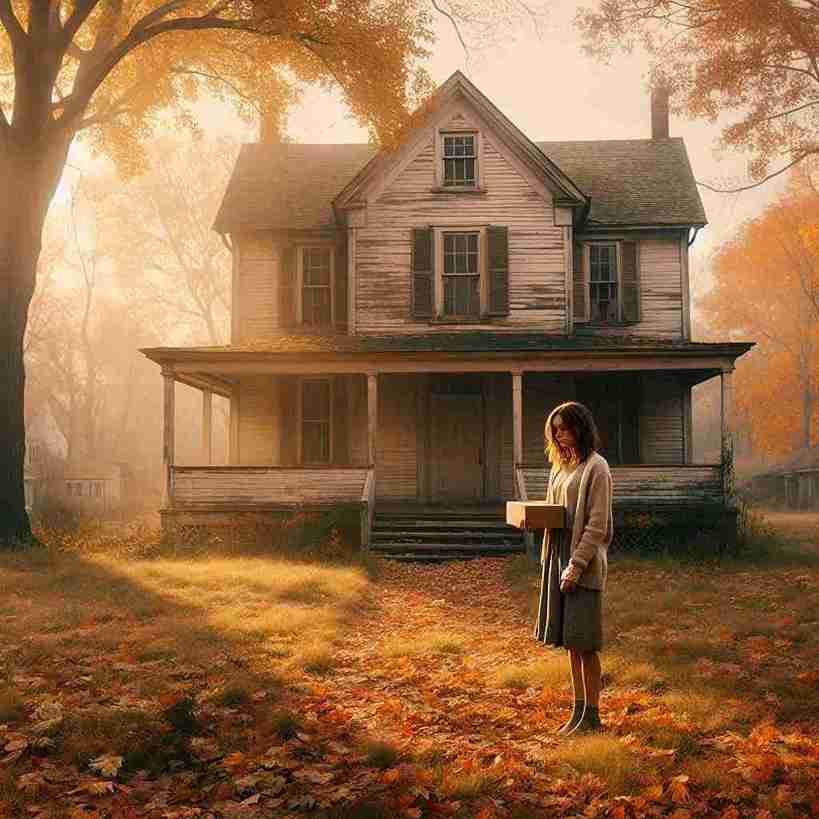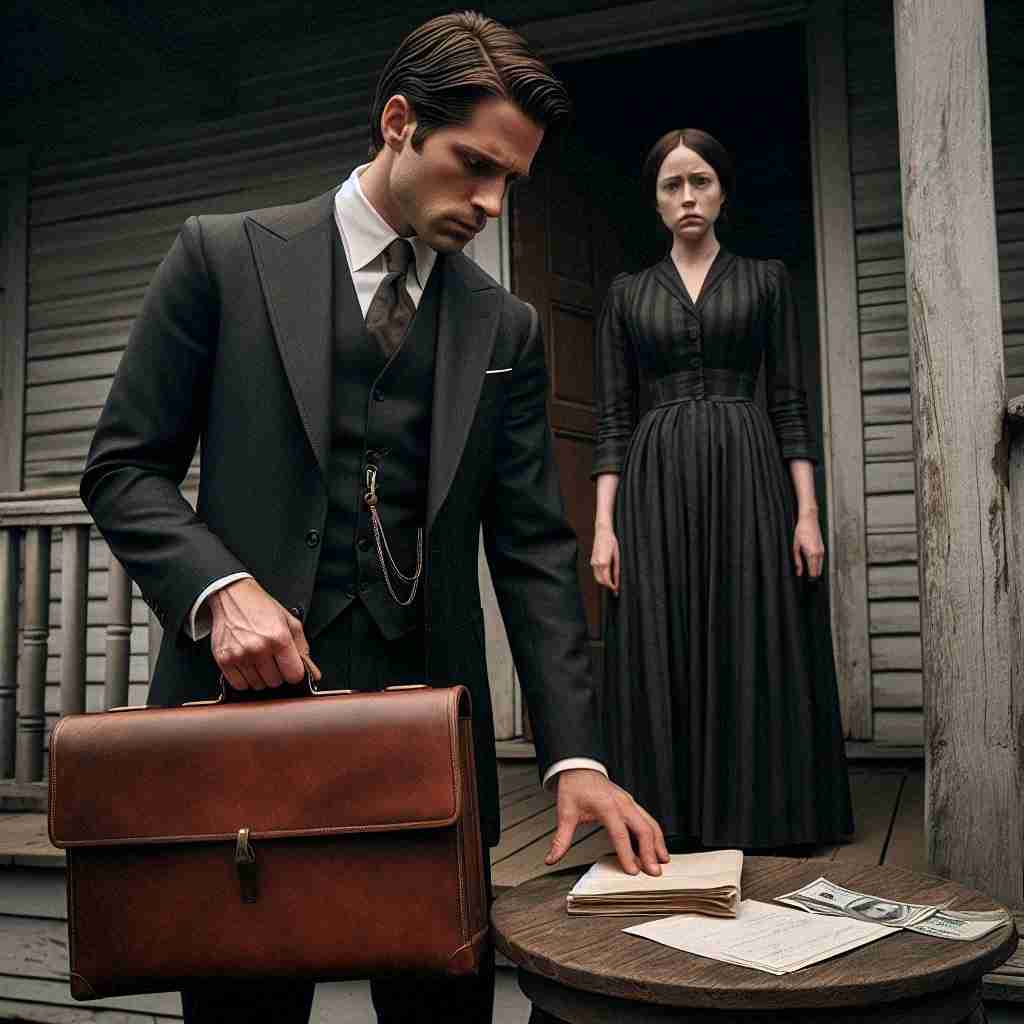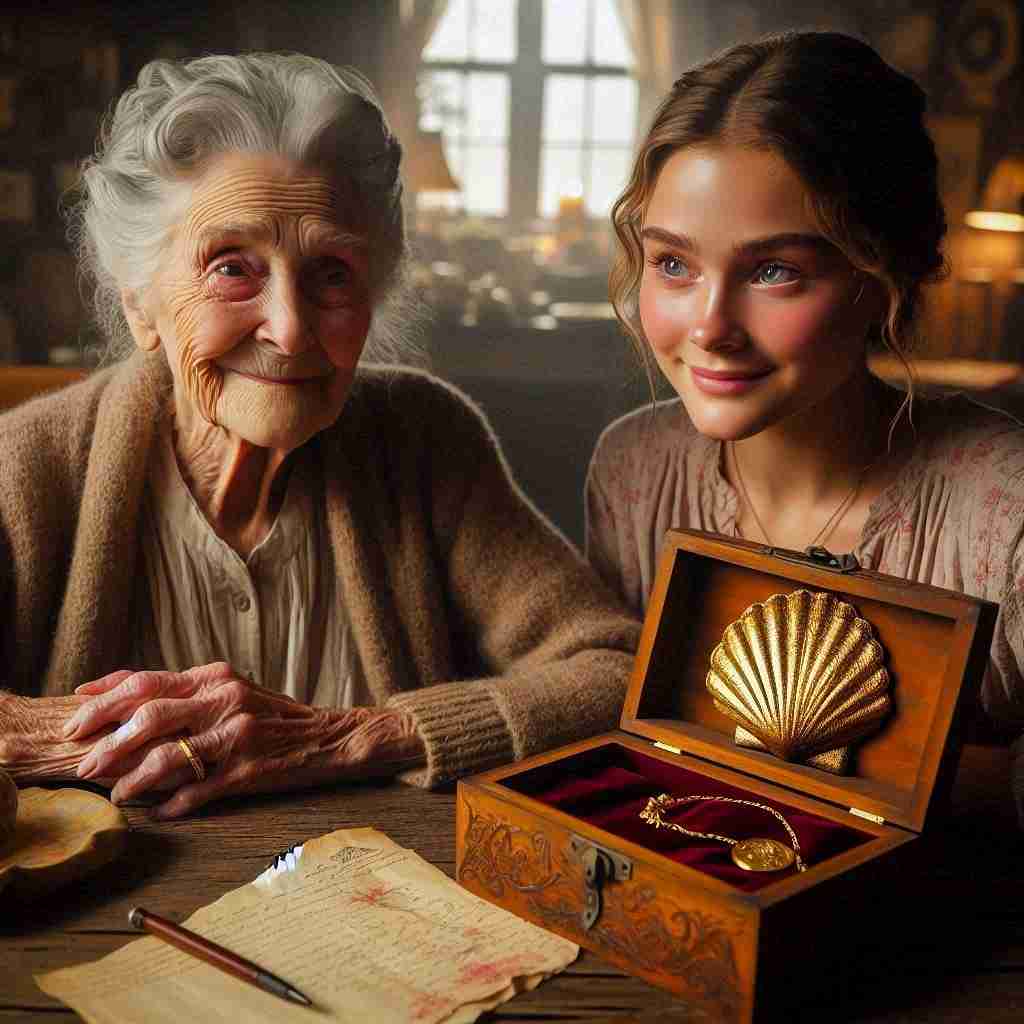Rachel Turner never imagined she would start her life over at thirty-eight. But after a painful divorce that felt like it had drained the marrow from her bones, she found herself standing in front of a small, crooked house at the edge of town. The shutters leaned. The porch sagged. The roof complained whenever the wind pushed too hard.
But it was hers.
For the first time in years, she felt something close to freedom. The house smelled of lavender, old wood, and possibility. Her daughter Emma spent weekends with her, and in the quiet stretches of weekday mornings, Rachel walked barefoot across floors that echoed with no one’s footsteps but her own.

She was healing — slowly, uncertainly, but healing.
One cold autumn morning, she stepped outside with her coffee and froze.
A big yellow Labrador sat calmly in her garden, as if he had been waiting for her. His fur was dusty, his breathing a bit labored, but his eyes were warm honey — gentle and patient.

“Well, hello there,” Rachel whispered.
The dog wagged his tail once, slow and grateful, then lifted a paw as if greeting an old friend. She knelt, running her fingers through his fur. Around his neck hung a tag:
Max.
If found, call: 555-0197.
She dialed the number immediately.
A fragile voice answered, wavering with worry.
“Max? You found my Max?”
An hour later, an elderly woman arrived — silver-haired, dressed with the quiet grace of someone who had loved deeply and lost more deeply still. She wrapped her arms around Max, burying her face in his neck. Her hands trembled as she whispered, “I thought I’d lost the last piece of my husband.”
Rachel helped her steady herself. The woman introduced herself as Mrs. Eleanor Whitcombe, a widow who had lived in the neighborhood for decades.
“You have no idea what this means to me,” Eleanor said softly.
Rachel smiled, expecting that to be the end of it.
She was wrong.
Three days later, while Emma was at school and Rachel was unpacking a box of old photos, a knock echoed through the crooked house. She opened the door and found a man in a pressed suit standing on her porch. He carried a leather briefcase and wore the expression of someone who never knocked unless he wanted something.

“Ms. Turner?” he asked.
She nodded.
“My name is Mr. Landon. I represent the Whitcombe family.”
Rachel straightened, already uneasy.
“I’m here about the dog — Max.”
He opened his briefcase with precise movements and placed several papers on the small table near her entryway.
“We need a small correction from you,” he said. “A simple adjustment to the date you found the dog. Nothing significant.”
Her eyebrows rose. “Why would the date matter?”
He didn’t blink.
“You would be helping settle a legal matter. Mrs. Whitcombe’s nephews are trying to claim their rightful access to her estate. But due to a clause involving Max… well, your confirmation could accelerate things.”
He slid a check across the table.
$150,000.
Rachel felt her breath catch. Her throat tightened.
“Is this… real?” she whispered.
“Very real,” he said calmly. “All you have to do is sign the statement. Change the found date from Tuesday to Saturday. That’s it. You help us, and this”—he tapped the check—“helps you.”
Her mind spun.
$150,000.
She imagined the possibilities in a rush — the mortgage on the crooked house completely paid off, Emma’s college savings secure, new furniture, breathing room, safety, comfort. Things she hadn’t felt in years.
But then, as sharply as a knife sliding between ribs, she remembered Mrs. Eleanor’s trembling hands. The way she clung to Max as though he carried her heartbeat. The loneliness in her eyes. The gratitude.
“Her nephews,” Rachel said slowly, “they don’t seem to care much about her.”
“They care about what’s… pending,” the man replied.
Inheritance.
Of course.
The truth sharpened in Rachel’s chest: they didn’t want Max. They wanted what Max stood between them and.
Rachel exhaled shakily and pushed the papers back toward him.
“No.”
The man blinked, then stiffened.
“I think you misunderstand the generosity of this offer.”
“I understand perfectly,” she said. “And the answer is no.”
His jaw tightened. He gathered the papers, slammed his briefcase shut, and walked out without another word. The air felt colder after he left.
Two days passed quietly — almost too quietly. Rachel felt a small prickle of fear whenever she passed the windows. But she didn’t regret her choice. Not for a second.
On the third morning, another knock sounded.
This time it was gentle.
When she opened the door, Mrs. Eleanor stood there with Max beside her. The old woman’s eyes were warmer than Rachel had ever seen.
“May I come in?” she asked softly.
Of course she could.
Inside the kitchen, Eleanor placed a wooden box on the table — old, carved, polished with years of reverence.

“It belonged to my husband,” she said. “Everything in it… carries his wishes.”
Rachel hesitated. “Mrs. Whitcombe, I didn’t do anything special.”
“You did something honest,” the widow replied. “And in my life, honesty has been the rarest treasure.”
She opened the box.
Inside was a small gold pendant shaped like a seashell, a letter sealed with blue wax, and — to Rachel’s shock — a deed.
“To the cottage by the sea,” Eleanor said. “My husband wanted it to go to someone who helped Max for no reason other than kindness. It was his way of leaving a blessing for whoever showed compassion when he no longer could.”
Rachel stared, speechless.
“People think kindness is weakness,” Eleanor whispered. “But it is the strongest thing we have.”
The seaside cottage became Rachel’s sanctuary.
Salt wind slipped through its curtains. Seagulls cried overhead. Waves wrote and erased their own stories along the shoreline. And within those peaceful walls, Rachel rediscovered something she thought had died with her marriage:
Joy.
She began painting again — splashes of seafoam blues, gold sunsets, quiet mornings. Her art bloomed in the way flowers bloom after a long winter.
One afternoon, during her first local exhibition, a man approached her. Daniel. Steady voice, gentle smile, eyes that held both tragedy and hope — someone who understood what it meant to rebuild.
They talked until the gallery lights dimmed.
Then they talked again the next day.
And the next.
Eight months later, Rachel stood barefoot in the sand outside her seaside cottage, wearing a simple dress as the sun dipped low. Daniel waited at the edge of the shore — her future steady and real — and Emma stood proudly as maid of honor.

And Max, now older, slower, but still faithful, trotted down the aisle with their rings tied around his collar.
Rachel’s breath caught as she whispered her vows. She wasn’t just marrying a man. She was marrying the life she had fought to rebuild — one filled with peace, trust, and gentle mornings.
Sometimes, late at night, she thinks about the $150,000 she turned down. About the life she could have bought. The ease she could have taken.
But every time the sea breeze slips into her studio, carrying the scent of salt and lavender, she smiles.
Because that money could never have given her what integrity did:
Peace.
Love.
A home that healed her.
And a second chance at happiness.
In the end, that crooked little house gave her the greatest gift of all —
the strength to choose the right path…
and the life that waited for her on the other side.

0 Comments